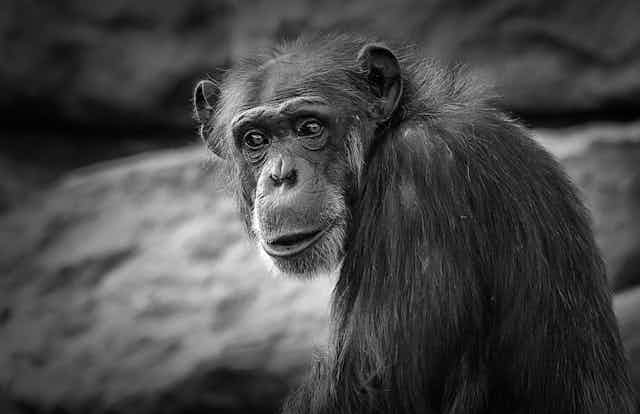Not all chimpanzees are created equal. Not only are some more intelligent than others, but about half of this variation is genetically inherited, according to research published today in Current Biology.
Professor William Hopkins and colleagues from Georgia State University and Yerkes National Primate Research Center tested chimpanzees using 13 different cognitive tasks to give a generalised measure of intelligence.
“Our results suggest that, like humans, chimpanzees appear to have what would be considered an underlying ‘g’ factor [general intelligence] or latent trait that contributes to intelligence,” Hopkins said.
Individual variation in intelligence was partly due to genetic differences. Given our evolutionary closeness to chimpanzees, these findings may shed light on the genetic basis of human intelligence.
Measuring intelligence
Hopkins and colleagues tested the intelligence of 99 captive chimpanzees (Pan troglodytes) using the Primate Cognition Test Battery, a set of 13 tasks designed to measure cognitive performance in social and non-social contexts.
The tests variously measured problem-solving ability, spatial cognition, tool use and social communication, among other skills.

Performance across these tasks was combined to give a measure of underlying intelligence, known as the general intelligence factor or ‘g’ factor. The researchers then used quantitative genetics to measure the heritability of these traits.
“From a species level, intelligence is absolutely inherited,” Associate Professor Andrew Lonie, a computational biologist at University of Melbourne, explained.
“I mean, that’s what defines humans. Obviously you expect a human to be more intelligent than an animal that is not a human, and that’s because they have human genes.”
But in quantitative genetics, heritability has a more specific meaning: it does not tell us how much of intelligence is due to genes, but rather what proportion of variation within a population is genetically influenced.
Genetic factors were responsible for about 50% of variation in the chimpanzees’ intelligence, with the most heritable traits being those related to spatial cognition and social communication.
The importance of genes
Environmental and social factors also affect an individual’s intelligence. In fact, the social intelligence hypothesis suggests that primate intelligence evolved in response to increasingly complex social environments.
This emphasis on social factors meant that researchers often neglected the influence of genes, according to Professor Gisela Kaplan, an ethologist at University of New England.

“The social intelligence hypothesis has in fact relied largely on social criteria in the past – a complex set of criteria but all of them social and environmental,” Kaplan said.
“And now here we have the first example where genes are put back into the picture. We have evidence that some of those traits have become heritable.
"This is the first study of its kind. […] To say that some animal has a mind, and that it can vary from one individual to the next as part of an inherited structure, acknowledges something far more daring by implication than simply saying they are cognitively complex.”
A window into humans
Despite massive interest in the underlying mechanisms of intelligence, research on humans is frequently confounded by cultural factors such as education. Professor Hopkins and colleagues hope that their chimpanzee research will offer a different perspective on human intelligence.
“In the human IQ field, we know that socio-cultural and early social experiences can have an impact on the development of IQ and thus, whatever genetic processes mediate IQ can be modified or masked by these factors,” Professor Hopkins said.
“The fact that such variables cannot account for our results – that is, chimpanzees do not have formalised education systems – reinforces the view that genes are important for human intelligence, but they illustrate this in a much simpler manner.”

Lonie agreed that these findings were potentially relevant to human intelligence, but added that more research was needed to isolate the underlying genetic mechanisms.
“I think the brain is about the most complex thing you can imagine in the world and it’s a long, long way from the gene that produces proteins to the function of the brain, if that makes sense.
"It’s very hard to know what any gene does […] so the interactions of hundreds of genes that end up creating a brain, that then does something that you can measure called intelligence that is not very easy to describe anyway, are very complicated.”

